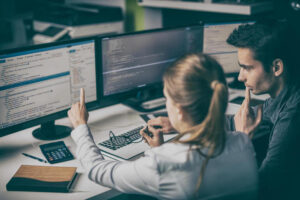Murat Sonmez, managing director of the World Economic Forum, explains how big data and machine learning can help find a vaccine for COVID-19.
Dan Patterson, senior producer for CNET and CBS News, spoke with Murat Sonmez, managing director of the World Economic Forum, how big data and machine learning can help find a vaccine for COVID-19. The following is an edited transcript of their conversation.
Murat Sonmez: The World Economic Forum is a 50-year-old international organization, focused on public-private cooperation, bringing together business, international organizations, governments, academia, and civil society, to understand how we can shape a better future for the world and create action groups to that effect. In terms of the data piece, we launched an initiative called the Center for the Fourth Industrial Revolution to really look at how we can leverage emerging technologies, to accelerate these solutions. A key part of that is artificial intelligence (AI) and machine learning (ML). And we can come up with insights far better and faster than human experts can. But it thrives on data. So access to data and being able to use different data sets for individual purposes has been a key area of focus for us.
SEE: Coronavirus: Critical IT policies and tools every business needs (TechRepublic Premium)
The three indicators of healthy living is, who you are, that includes genetic data, your vitals; and where you live, environment, lifestyle; and how you live, lifestyle. It’s who you are, where you live, and how you live. And when you go to a physician, they basically ask these questions to you. But imagine a world where we can collect these data sets without you going to a hospital or a physician, or you may not have access to a hospital, or you may not be able to go, as we see during the COVID-19 crisis. What if we all had wearable devices, and we have our mobile phones, and through them, we transmit all of that data? How we live. Combine it with genetic information, with clinical trials, hospital records, and environment data, that would come from sensors, the so-called Internet of Things (IoT) installed in our cities and environment, and also the sensors in the agricultural fields or satellite data.
If you can combine all of that and put it into a common place, then we can use advanced analytic capabilities, which I would describe as machine learning, where the engine itself will come up with insights, faster and better than human experts can, because of the magnitude of data. They could augment human intelligence. Now, it’s technically feasible. The key problem is, how do we ensure that we protect the privacy of the individuals, and how do we make sure that we use the data for consented purposes? I don’t want my genetic data to be used for commercial purposes, but I may want to use it to help cure COVID, for example.
SEE: Managing AI and ML in the enterprise 2020: Tech leaders increase project development and implementation (TechRepublic Premium)
The third question is who makes money out of that and the equity? What we have been doing is saying privacy is key, obviously, which is why Europe and California have been leading in that area, but we should not have privacy only focused on data get in the way of sharing it for common purposes. Today, if you wanted to combine all three data sets, it’s impossible, because privacy laws will get in the way. The idea of combining different data sets for permanent use cases by the owners of data and providing economic benefits to the owners of data, could create a whole new set of opportunities in terms of discovery, healthy living, and also new income sources for owners of data.
Dan Patterson: I like the way you frame AI as advanced analytical abilities or capabilities. Do you have examples of how these technologies are helping people in the real world right now?
Murat Sonmez: The most famous one, I think, is what DeepMind folks did, after they were acquired by Google. DeepMind is a company that three guys out of London started. And they mastered the most challenging problem in AI, which is playing a game called Go. But after Google acquired them, they turned the engine on their data centers and reduced energy consumption by more than 20%. They applied the same concept to a building and reduced energy consumption by more than 50%. Imagine if you apply that to a city or country, we have the opportunity to reduce energy consumption, improve agriculture yields, or even accelerate the cure for some of the intractable diseases.
SEE: Building the bionic brain (free PDF) (TechRepublic)
The reason we haven’t seen major breakthroughs is because of lack of ability to connect different data sets together. Researchers are finding it difficult, and if we want to develop a new product, we need to have access to data sets. But probably some laws that have been in place or based on 1980s case law are not designed to enable this. And again, we need to protect the privacy of the owners of data, but also enable these new use cases.
Dan Patterson: How can artificial intelligence help us find a vaccine for the coronavirus faster?
Murat Sonmez: We know that if you provide a lot of data that is representative, not unbiased, machine learning algorithms will come up with new insights faster than human experts can. At the moment, we don’t know how it’s happening, but we know what it is. So if you take it to the scientific method, which is what scientists have been using, we start with a hypothesis and experts as well, I think this will happen. You collect data sets, and now you’re trying to analyze it and test it all the way. We can actually accelerate the early phases of that. If we feed different data sets, as long as they’re complete and they are from trusted sources, the artificial intelligence or machine learning algorithm can come up with this hypothesis. I think we’ll be in a place where we will generate more hypotheses, much faster, and that would have to take us through the scientific method of testing that. I think it will be an excellent writer at the front end. And until we solve the black box challenge with AI and machine learning, I think that’s pretty much what we can do at the moment.
Also see
” data-credit=”Image: Derek Poore” rel=”noopener noreferrer nofollow”>

CBS News’ Dan Patterson speaks with Murat Sonmez of the World Economic Forum about how big data and machine learning can help find a COVID-19 vaccine.
Image: Derek Poore
Source of Article




